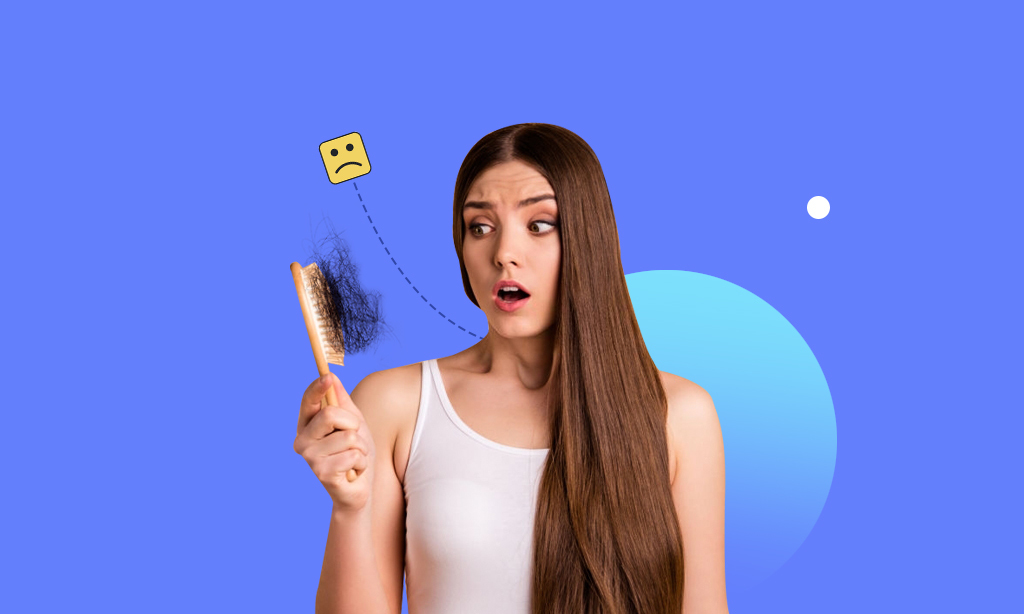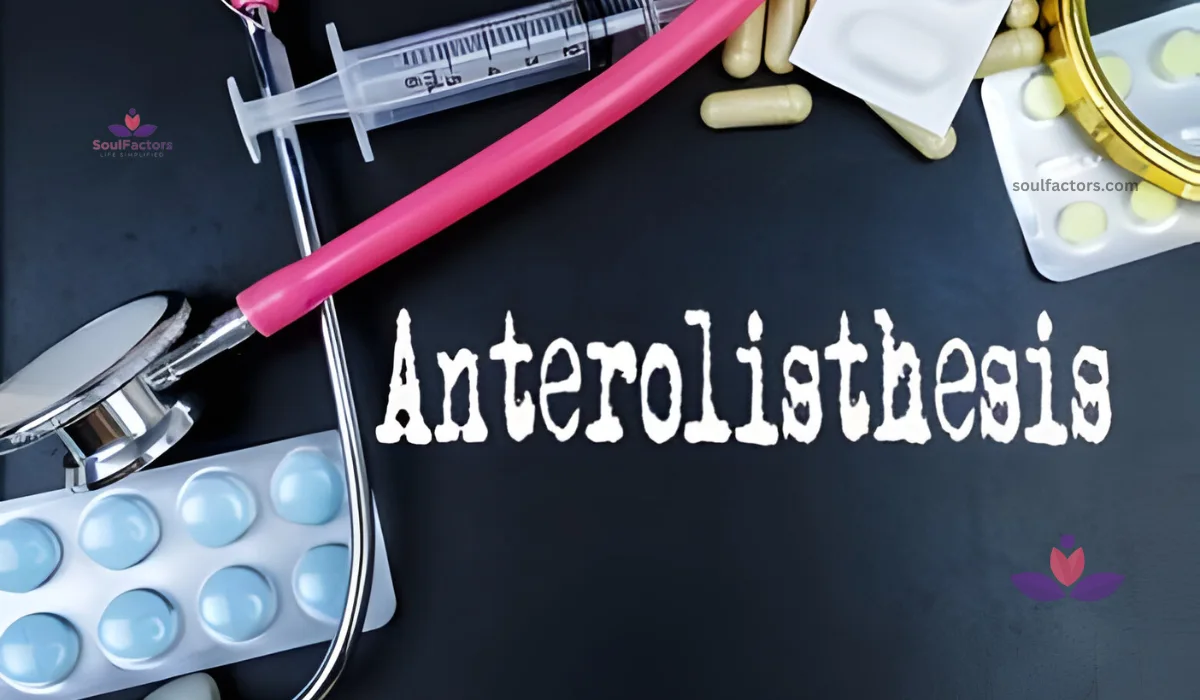PCOS Hair Loss: How To Reverse It?
Living with PCOS hair loss is something you never asked for. The added hair growth in other areas of your body fuels hopelessness. Thankfully, there are remedies.
On Apr 3, 2023 – 10 minutes read

Anyone who has experienced hair loss will know how serious and scary it is. But people with medical conditions like PCOS have no choice but to watch their hair loss with resignation. With the prevalence of hormone imbalances growing in women, PCOS hair loss has become a common concern in today’s world.
Causes And Treatments Of PCOS Hair Loss
PCOS hair loss or hair thinning is not a surprise for those with polycystic ovary syndrome. Bald patches citing on the hairline and the once luscious lock of a ponytail is now merely a few strands tied around. And worse, only to find the long strands shedding away with each shower trip to the bathroom. How can someone come into terms with that?

Is there any treatment for PCOS hair loss? If yes, can it reverse the unpleasant symptoms as well? Read on to find a more detailed dig.
What Is Polycystic Ovary Syndrome?
PCOS is a common condition that affects the hormone level of women of reproductive age. It affects 5-18% of women in the US. A 2022 study found that globally, the burden of PCOS has increased at an alarming rate over the period 1990-2019, making it a major public health concern(5). This hormone imbalance produces excess male hormone levels and causes prolonged or infrequent menstrual periods. This also makes it harder for them to conceive. Their ovaries develop a copious amount of small collections of fluid (follicles) and in turn, fails to release mature eggs regularly.

The hormone disorder is one of the most common causes of female infertility that affects numerous women across the globe. Especially when it comes to the range of disheartening symptoms, like alopecia and hirsutism – which means hair loss and excess hair growth respectively.
But why is there hair loss and hair growth together at once? Well, hair growth due to PCOS happens not on your head. Instead, the hair growth will be in certain places of the rest of the body. Places you do not want hair to grow.
What Is PCOS Hair Loss And Hair Growth?
While some women have thicker than normal hair growth on their face or the rest of their body, many women with PCOS experience thinning scalp hair and hair loss. It is referred to as, more recently, female pattern hair loss and androgenic alopecia — due to the high levels of androgens found in women with PCOS(1).

Now, what is female pattern hair loss or androgenic alopecia? It is the loss of hair density at the frontal and vertex regions of the scalp — the top (shown in the image). It is when the hair is thinning, shortening, and falling out at the roots, causing widening in the middle part, thinning behind the front hairline and temples. But there is no complete baldness as seen in men.
What Causes PCOS Hair Loss?
It is believed that PCOS hair loss or hair thinning is caused by the production of excess androgen. Normally, progesterone (female sex hormones) binds to the receptors of hair follicles and prevents hair loss. So, for women without PCOS, progesterone is the warrior of hair loss prevention. Because unfortunately, progesterone levels go down in women with PCOS condition and their ovaries produce excess androgens (male hormones). This condition is called hyperandrogenism.

In the absence of progesterone, testosterone is broken down into one of the androgens called dihydrotestosterone (DHT) within the hair follicle’s oil glands. DHT binds to the hair follicle receptors, like the key and lock mechanism. However, DHT weakens and shrinks the hair follicles — killing it off in the process, and the healthy hair of women with PCOS cannot survive. Some women are more efficient in producing DHT or may have sensitive receptors which makes them more susceptible to hair loss.
While we blame androgen alone for hair loss, it is essential to note that androgenic alopecia is more common in postmenopausal women. Since their androgen levels are usually normal, we cannot confidently put the blame of PCOS hair loss on androgen. In simpler terms, female pattern hair loss or androgenic alopecia likely involves a complicated hormonal interplay of both androgen and estrogen as well along with other factors like the woman’s genes.
What Causes PCOS Hair Growth?

As the female body produces male hormones called androgens, it includes testosterone as well. This may result in virilization, and stimulate excess hair growth not only in the underarms and pubic areas but also hair growth in places where it doesn’t usually grow. Such as the face, neck, chest, and abdomen.
Can Treatments Reverse PCOS Hair Loss?
One major factor to deliberate while reversing PCOS hair loss is the difference between hair loss in a male and androgenic alopecia in women with PCOS. The good news is that in women with PCOS, the hair follicle remains alive, unlike that in men.
Hence, the chances of the treatments for PCOS hair loss working is greater. It won’t grow back on its own, of course, but the treatment may be able to stimulate the growth of new hair. Besides, the treatments are to limit the production of male hormones and to increase the production of female hormones in the body.

If your doctor diagnoses you with PCOS, by addressing the underlying hormonal imbalance or disorder, following the integrative approach, hair regrowth is not impossible. With medication and lifestyle changes, your scalp will be ready for the regrowth of healthy hair.
The answer to how long does it take for the hair to grow depends on how fast your hair grows. But if your hair is already damaged to the point of no room for repair, you may need a different hair care regime to fix that first.
Most importantly, a holistic treatment that focuses on your entire body can reverse your hair loss and provide a long-lasting impact on your luscious hair. Because synthetic medication that focuses specifically on your hair may gradually damage your hair follicles. That alone may not be the only solution.
What Are The Treatments For PCOS Hair Loss?
There are two options for you; medical treatments and changing lifestyle choices. Since PCOS hair loss is caused by hormonal imbalance, hormone regulation through a variety of medications is an important part of treatment. You may need to try a few medications to find the one that works for you. There are not a lot of scientific studies supporting these medications. But they are believed to be effective in many women. They include the following:
Oral Contraceptive Pills
Your doctor may prescribe oral contraceptive pills along with anti-androgen drugs with a combination of other medications to control PCOS and hair loss. Oral contraceptive pills work by lowering androgen levels and by increasing the production of the sex hormone-binding globulin(2) (SHBG) in the body. This will result in a reduction of the symptoms of PCOS, including excess hair growth, PCOS hair loss, while also helping with irregular periods and acne.

Spironolactone
A diuretic drug, known as an aldosterone receptor antagonist, helps to control androgen activity in the body by fitting into the receptor site and stopping the androgen from getting in there. With anti-androgenic properties, this is an effective treatment for androgenic alopecia by blocking the effects of androgen on the skin.
It is an off-label treatment and is usually advised to be taken daily but only after consulting. Since it is usually prescribed together with an oral contraceptive, you can take it with Rogaine as well. This potassium-sparing diuretic is approved by the FDA as a diuretic to treat fluid retention.

However, it disrupts ovulation, estrogen metabolism, and adrenal function. So you need to be cautious of the side effects. Don’t ignore symptoms such as irregular menstrual cycles, dizziness, lethargy, stomach upset, headaches, and breast tenderness. If Spiro is not for you, your GP can prescribe any other oral anti-androgens for your PCOS hair loss.
Minoxidil
Along with oral medications, your doctor may prescribe topical ointments like Minoxidil, also known as Rogaine(3). It is a vasodilator that comes as a liquid or a foam form at different strengths that you can apply to your scalp, concentrating on areas of hair thinning. Massage daily to promote hair growth and give a thicker appearance. When taking it in oral form, it may cause hypertrichosis (excess hair growth). So, this is not the best option for a woman with excess facial and body hair.
A study found that low-dose oral Minoxidil together with Spironolactone resulted in a reduction of hair loss in women. It may not cure PCOS hair loss, but it can help manage it. And once you stop using it, the hair loss may reoccur. The side effects may include scalp dryness and itchiness. You can now buy this FDA-approved drug over the counter for female pattern hair loss.
Laser Phototherapy
For hair thinning as a result of PCOS, phototherapy is a well-known medical treatment with no side effects. It irradiates photons into scalp tissues and they get absorbed by weak cells to stimulate hair growth. Laser phototherapy has a similar action to Minoxidil and stimulates circulation to hair follicles but also improves hair quality and structure.

It is easier because it doesn’t have to be performed every day. As a result, the hair of the patients improves over time. It is also safer and less invasive than hair transplant surgery. Laser phototherapy sessions in clinics start from £45.
Finasteride
While they haven’t been approved for androgenic alopecia, some doctors prescribe finasteride as off-label for women with PCOS hair loss. Because they are approved by the FDA for treating hair loss in men. It can prevent testosterone from binding to receptors on hair follicles. But you must not take it alone, instead take it combined with an oral contraceptive because you cannot ignore the potentially damaging effects it has on pregnancy.
Hair Transplant
This surgical procedure to implant hair on the scalp is common but invasive. Hair and hair follicles are removed from areas with a lot of hair and transplanted or grafted into the area where thinning is prominent. There is no guarantee that a hair transplant will work, and it is quite expensive as well ($15,000).

Disclaimer: You cannot, under any circumstance, make use of any of the medical treatments mentioned above without consulting with a doctor. This is solely for educational purposes.
How Does PCOS Hair Loss Look Like And How To Camouflage It?
Your hair tresses will get thinner in diameter and the density, thickness, and volume will be noticeably reduced. Hair loss at the vertex and temples of the frontal hairline will form triangular patches of baldness. Not to mention, your strands will fade into a lighter shade appearing dull, weak, dry, damaged, and frizzy. This is how PCOS hair loss looks like.

But you have different options to camouflage the patches with different hairstyles. You can part your hair in other areas to cover, get bangs that start further up on the top of your head, or shorter and layered hairstyle to add volume, or tie your strands in a top knot or low ponytail, use volumizing hair products, use a headband or scarf wide enough to cover the patches, use a partial wig or wig fall and cover the thinning hair. Brainstorm your head to come up with your own styles!
Home Remedies For PCOS Hair Loss
PCOS has a direct intervention on your lifestyle choices. If you want to opt for more natural options, you can follow these home remedies to help with PCOS hair loss:
- Take 50 mg of zinc supplement daily for 8 weeks to help with hirsutism.
- Take a marine protein supplement containing biotin for three months for a positive effect on PCOS hair loss.
- Exercise or perform yoga regularly to lose weight and in turn lower androgen levels. Losing 5 to 10 percent of your body weight can significantly reduce PCOS symptoms.
- Use herbal shampoos or sulfate-free shampoos that are mild and are designed to stimulate hair growth.
- Massage your scalp with natural essential oils regularly to help in blood circulation and strengthen the hair follicles.
- Use a soft hair bristle comb to control hair fall.
- Make homemade hair masks with natural ingredients that can encourage hair growth. Take an egg and mix with a teaspoon of olive oil. Apply it on your hair from roots to the tips, leave it for 20 minutes, and rinse with shampoo.
- Plan a sustainable diet and stick to it to control the production of male hormones. Add to your diet: food rich in fiber content, herbs, natural and unprocessed foods. Drink herbal teas.
- Avoid eating inflammatory foods, refined flour, added sugar, junk foods, and limit your take of milk products.
What Else To Target?
The causes of PCOS include disrupted secretion of hormones in the endocrine system, insulin resistance(4) (failure of converting glucose from the blood into energy and triggering the pancreas to produce excess insulin), poor gut health, thyroid issues, psychological stress, environmental toxins, rapid and excessive weight gain. So, if you target the root cause of your PCOS, it can help in reversing PCOS hair loss to a great extent.

Subscribe to Newsletter
Elevate your routine, stay on trend, and embrace a personalized beauty journey with our curated insights.





Write a Comment